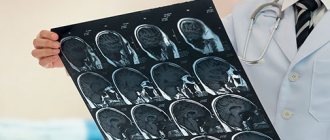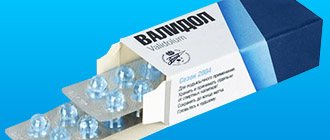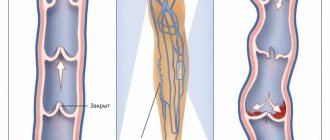Headache medications you can take during pregnancy
Antispasmodics
Often the cause of pain can be a spasm of blood vessels in the brain, neck muscles or the back of the head.
In such cases, products that contain substances that relax the walls of blood vessels are effective. Due to this, the diameter of the vessels increases and blood circulation is normalized.
It is important to know that this group of drugs is effective for tension headaches.
Antispasmodics are the safest group of painkillers during pregnancy.
“No-spa” (“Drotaverine”) is a drug that helps relax smooth muscle cells. This drug affects not only the walls of blood vessels, but also the cells of the intestines, biliary system, urinary system, and uterus. It is for this reason that “No-spa” is successfully used during pregnancy with increased uterine tone.
Thanks to numerous studies, it has been revealed that this medicine does not have a negative effect on the fetus and does not cause developmental defects.
Application should be in acceptable therapeutic doses, since exceeding the dosage may lead to side effects:
- Decreased blood pressure (to the point of fainting).
- Heart rhythm disturbances (increased heart rate).
- The emergence of a tendency to constipation (due to decreased intestinal motility).
Contraindications for use are individual sensitivity to the active substance, hypotension from 90/60 mmHg. and below, tachycardia from 110 beats/min.
Combined antispasmodic analgesics, which in addition to the antispasmodic component contain another active ingredient - an analgesic, are prohibited for use during pregnancy. Such drugs include “Spazmalgon”, “Andipal”.
Medicines that lower blood pressure
One of the causes of headaches is increased blood pressure. For pregnant women, this situation is most relevant for a number of reasons:
- an increase in circulating blood volume during gestation by almost 40%;
- the development of gestosis, which is characterized by increased pressure, as well as fluid retention in the body;
- increased load on the cardiovascular system;
- exacerbation of existing chronic kidney and heart diseases.
Increased pressure is manifested by pain, most pronounced in the occipital region. There may be a feeling of heaviness in the head, flashing “spots before the eyes.”
Among the approved centrally acting antihypertensive drugs, they include (“Dopegit”) and a solution of “Magnesium sulfate” (“Magnesia”).
"Dopegit" acts on alpha-adrenergic receptors located in the brain.
It can be used during pregnancy for a number of reasons:
- There is no negative effect on fetal development.
- Adequate uteroplacental blood flow is maintained.
"Magnesia". When a pregnant woman experiences a headache associated with high blood pressure, the Magnesium sulfate solution is highly effective. In addition, it is a tocolytic (reduces the tone of the uterus), promotes the removal of fluid from the body (with edema).
This medicine is successfully used in obstetrics; it is especially necessary if a pregnant woman has gestosis, as it affects many parts of the pathogenesis.
The main route of administration is intravenous infusion, less often intramuscularly.
If necessary, tablet magnesium preparations (Magnerot, Magnelis, Magne-B6) are prescribed. Their effect appears gradually, the duration of therapy ranges from 10 to 30 days.
Preparations based on paracetamol
This group of medications can relieve pain of moderate intensity without harming the condition of the fetus.
The drug penetrates the placental barrier, but according to studies, Paracetamol does not have a toxic or teratogenic effect (does not cause developmental abnormalities) on the fetus. It should be remembered that the use of this drug should be limited.
Analogues of Paracetamol are Panadol, Efferalgan.
Headache during pregnancy
When to go to the doctor?
Headaches in later stages often indicate high blood pressure. This condition is dangerous and requires specialist intervention. Immediate assistance is provided when protein is detected in the urine, which indicates preeclampsia. A doctor's examination is required if:
- persistent migraines, increasing pain intensity;
- decreased sensitivity, spasms, deterioration of visual and auditory perception;
- headaches immediately after waking up;
- pressure surges accompanied by discomfort, dizziness
What can you do for a headache?
There are a number of medications that women can take for different periods of time. Self-medication in this case is excluded; medications are prescribed only by a doctor. What can you do to relieve headaches during pregnancy? First of all, ensure yourself proper rest, healthy sleep, and walks in the fresh air. Also recommended:
- Make an appointment with a physical therapist or osteopath if you suspect excessive muscle tension in the neck.
- Do not neglect special gymnastics.
- Stick to regular meals. It is recommended to divide the diet into small portions and eat food frequently.
- During attacks, apply warm or cool compresses (depending on the type of pain).
Medicines
Severe headaches during pregnancy can be eliminated with medications prescribed by a doctor. Paracetamol is often prescribed. However, in large doses it is dangerous, and therefore, even with intense pain, you cannot dose the drug yourself. Ibuprofen is prescribed no later than 30 weeks of pregnancy. The drug can cause premature closure of the fetal ductus arteriosus if taken late in pregnancy. Combination drugs are not recommended. Anti-migraine drugs with triptans have an abortifacient effect.
Prevention of headaches in the early stages
It is important to resort to activities that prevent attacks. If the patient suffers from migraines, then headaches in the early stages of pregnancy may occur due to the consumption of cheese, chocolate, products containing monosodium glutamate, and dyes. They must be excluded from the diet. Eat with caution:
- nuts;
- chicken liver;
- sausages.
Fractional meals are useful not only for the gastrointestinal tract, it also prevents headaches, since they are often provoked by a feeling of hunger. If it is not possible to have a full lunch, it is recommended to have fruits and biscuits with you.
During pregnancy, headaches often appear due to overexertion. It is necessary to normalize your sleep pattern, but not to increase its duration too much, since there is a concept of “weekend pain.” Pregnant women working at a table or machine need to take a break every 30 minutes, warm up, and go out into the fresh air. Avoid:
- strong odors;
- loud sounds (TV, concert, noisy companies);
- long exposure to cold or heat.
Professional help
If you do not know what to do with headaches during pregnancy, seek qualified help from specialists. Doctors will identify the root cause of the pain. If the situation allows, a treatment regimen will be prescribed. Medicines that relieve symptoms are also selected if therapy is not currently recommended due to pregnancy. It is important to remember that self-prescribing medications can lead to the formation of fetal malformations. For example, aspirin and its derivatives lead to heart defects and lower jaw defects. By contacting specialists, you receive: attentive and polite service, individual selection of medications based on the characteristics of fetal development and individual response to medications, condition monitoring until complete recovery.
What drugs are dangerous for pregnant women?
The group of non-steroidal anti-inflammatory drugs is not recommended for use during gestation. However, if your headache is very severe and other medications do not help, then you should adhere to the following rules:
- Avoid the use of analgin-based products as the most toxic of all drugs in this group.
- It is not recommended to take combined analgesics that contain several components that relieve pain. These include: “Pentalgin”, “Caffetin”, “Solpadeine”.
- It is better to give preference to medications with one active ingredient (preferably paracetamol-based).
- Try not to take two or more tablets in one day, and also avoid long-term use.
- If possible, avoid taking pills in the first trimester, when the formation of fetal organs and systems occurs.
Non-drug methods
Given the small choice of medications for relieving headaches during pregnancy, it is worth giving preference to alternative methods.
Massage
It has been proven that running your fingers from the frontal part of the head to the back of the head (in one direction only) helps eliminate stagnation of venous blood in the sinuses of the brain. This is explained by the presence of perforating veins on the surface of the head, which are connected to the venous sinuses.
Such a massage for 15 minutes can significantly reduce pain, even eliminating it completely.
For more information on how to get rid of headaches with massage, watch the video:
Neck massage
It is especially effective if your head hurts due to osteochondrosis of the cervical spine. After all, the vertebral arteries pass through the cervical region, compression of which can cause excruciating pain in the head.
Reflexology
Impact on certain points of our body leads to the activation of certain physiological processes. So, for headaches, light pressure on the temporal areas on both sides is effective; you can use light massaging movements in a clockwise direction.
Doctor's advice
Neck massage can only be done in the form of light pressure on the muscles, stroking, and in no case too much. Firstly, movements with intense pressure will cause muscle pain. Secondly, there is always the possibility of a hernia, massage in which is done very carefully.
Victoria Druzhikina Neurologist, Therapist
Pressing on the following points will help relieve headaches: at the base of the inner edge of both eyebrows, the center of the superciliary arches (the exit point of the supraorbital nerve), the middle of the bridge of the nose, the point between the base of the 1st and 2nd fingers of both hands. You need to gently press on each point for 2-3 minutes.
Drinking strong tea with sugar
It is effective to drink a cup of strong tea for headaches associated with low blood pressure. Coffee drinks should not be consumed during pregnancy, as caffeine can cause increased heart rate. Use caution in case of diabetes mellitus and gestational diabetes mellitus, which is common among pregnant women.
Normalization of the daily routine
If a pregnant woman often has headaches, she needs to adjust her daily routine. Normalizing sleep and rest is very important. For example, walking for 15 minutes before bed is very beneficial. Pain will become much less of a problem if you pay due attention to rest.
Taking a warm shower
Promotes relaxation and improves blood circulation in the body.
You should not get carried away with aromatherapy, as some essential oils can cause an allergic reaction.
There are currently at least 50 known reasons why a headache may occur. During pregnancy, the most common are tension headaches, as well as headaches that occur when pressure rises (for example, with severe gestosis).
Despite such a wide range of drugs available on the pharmacological market, during pregnancy their choice is extremely limited. Therefore, during the period of bearing a child, before taking this or that medicine, it is necessary to find out the cause of the headache.
Unsystematic use of pills can negatively affect the baby's development. We must not forget about the serious causes of headaches (vascular aneurysm, pathological tortuosity, space-occupying brain formations). A consultation with a gynecologist and therapist will help you understand the mechanisms of pain, as well as prescribe the necessary medication.
This article has been verified by a current qualified physician, Victoria Druzhikina, and can be considered a reliable source of information for site users.
Bibliography
1. https://www.mediasphera.ru/issues/zhurnal-nevrologii-i-psikhiatrii-im-ss-korsakova/2015/11/downloads/ru/591997-729820151118 2. https://journals.eco-vector .com/RFD/article/viewFile/1431/1051
Rate how helpful this article was
2.5 4 people voted, average rating 2.5
Did you like the article? Save it to your wall so you don’t lose it!
Headache in pregnant women
Tension headache (TTH) during pregnancy often occurs against the background of migraine, but does not cause severe discomfort to the woman requiring immediate treatment. Most often, TTH is caused by insomnia, especially in the last weeks of pregnancy, physical fatigue and toxicosis. To eliminate them, in most cases, adequate rest and sleep is sufficient.
Migraines during pregnancy are variable. In some cases, it begins simultaneously with pregnancy and disappears without a trace after childbirth. The most severe attacks occur in the first trimester; in the second and third, the intensity and frequency of migraine decreases until it disappears completely. In cases where women suffered from severe migraine attacks before pregnancy, after conception a decrease in the frequency of attacks is noted until their complete disappearance.
Headache during pregnancy can be a symptom of serious complications - gestational diabetes, preeclampsia.
Diabetes in pregnant women can develop asymptomatically and manifest itself as persistent mild headaches, increased urination, and itching of the genitals. For timely diagnosis of the disease, all pregnant women undergo a blood glucose test every 2 months.
The main symptom of preeclampsia is a significant increase in blood pressure, which is often accompanied by an intense headache with vomiting, which is often confused with a migraine. If such a headache occurs in the third trimester, the pregnant woman is immediately hospitalized.
Diagnosis of headaches during pregnancy is carried out if:
- A pregnant woman suddenly experienced severe pain.
- Headaches intensified and became more frequent during pregnancy.
- The pain is accompanied by additional symptoms - vomiting, nausea, fever, convulsions, loss of consciousness, increased blood pressure and increased urination.
The main feature of the treatment of headaches in pregnant women is the impossibility of prescribing most drugs due to their negative impact on the health of the mother and the development of the fetus (of the analgesics, only paracetamol can be used). For this reason, non-drug methods for treating headaches are primarily used:
- Elimination of factors that cause headaches - foods, drinks, situations.
- You need to drink at least 1.5-2 liters of water per day.
- Rest when you feel tired.
- During a headache attack, it is advisable to sleep or relax in a quiet, darkened room.
Author: K.M.N., Academician of the Russian Academy of Medical Sciences M.A. Bobyr










